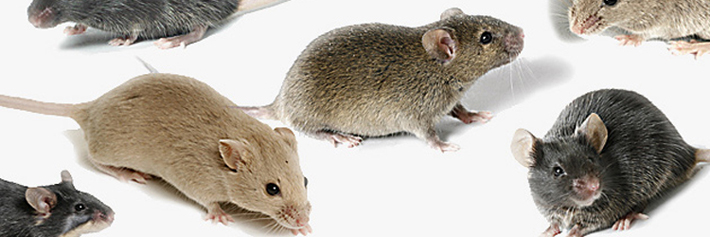
-
What are mice and rats?
Mice and rats are rodents. Rodents are mammals, who are categorized by having two incisors, which continuously grow and must be kept short by gnawing. There are 4 species of mice and rats commonly found in Pennsylvania including:
-
The house mouse
is a small rodent that has a somewhat pointed nose; small, black, slightly protruding eyes and fairly large ears for its size. They are generally grayish brown with a gray or buff colored belly. Not including its tail, they are roughly 2 inches long.
-
The white-footed deer mouse
is a light brown to black with a white underbelly. Slightly larger than the house mouse, it has bigger ears and eyes. These mice are commonly found in forested areas living inside burrows, logs, stumps or wood piles.
-
The Norway rat has many names,
the brown rat, gray rat, sewer rat, water rat or barn rat and is one of the most common rodents in urban areas. Typically grayish brown, Norway rats are 10 to 12 inches long including their tails, which are shorter than their bodies.
The Roof rat, also called the ship rat, is almost exclusively found in port areas. Black with large ears and eyes and sporting a lighter colored belly, these rats are 16 inches long from nose to tail, with tails longer than their bodies.
- Why do I have them?
Mice and rats are a common pest problem for home and business owners, especially during the fall and winter months. Both mice and rats will enter your home in search of food, shelter, warmth and water. They are commensal rodents; this means they need to share space with humans and partially depend upon us to survive. Mice and rats will gain entry to buildings through cracks and holes, but can also enter through openings that have been made for utilities. The size of hole required for entry will differ by species however. For example, an adult house mouse can fit through a hole no bigger than the tip of your pinkie or squeeze through a crack the width of a pencil.
- Are they dangerous?
Yes. Mice and rats can chew through wood, aluminum, cement and sheet rock. They can cause structural damage to homes by gnawing through wood and wallboard. Their gnawing can ruin baseboards, cupboards and furniture. They have been known to gnaw through plumbing pipes to gain access to water and they also will chew on electrical wires in attics and basement creating a fire hazard. Rodents are known to contaminate food and other products with their droppings and urine. They are known carriers of serious diseases, such as Lymphocytic choriomeningitis, Salmonellosis and the potentially fatal Hantavirus Pulmonary Syndrome. They can also carry ticks, fleas and parasites onto your property, leading to other pest infestations. Rats also burrow outside, causing damage to lawn and landscape.
How do I get rid of mice and rats?
Because mice and rats are extremely shy, quick moving and can be difficult to locate, especially if their nest is in the attic or behind walls, they are a very hard pest to get rid of. A Raifsnider pest professional will design a customized rodent control program that fits the specific needs of your property, with the goal of eliminating all of the dangerous and destructive mice and rats located within your property.
- Can I do it myself?
Getting rid of mice and rats is a difficult process and one that many homeowners do not have much success with on their own. Many do-it-yourself remedies, such as traps and baits are available, but simply do not work as the materials they use are not effective. Remember – if misused or mixed improperly, do-it-yourself pesticides can be very dangerous to people, pets or plants.
- Is the treatment safe?
The pest professionals at Raifsnider's Exterminating will first confirm the presence of mice or rats invading your home or business, and then create a treatment plan that will eliminate your pest problem quickly and in an environmentally responsible manner. Before any treatments begin, our inspectors will consult with you regarding your children, pets, and gardens and then based on your current situation; they will then customize a treatment plan specifically for you.
- How soon can you get here?
Raifsnider's Exterminating is committed to helping you as soon as possible. In most cases, we can respond the same or very next day.
- How can I prevent this in the future?
To prevent future infestations of mice and rats, homeowners can:
-
Seal all holes and cracks in the foundation, siding and roof areas. Seal all pipe chases and wire conduits entering the house from outside. Wire mesh sealed with caulk or foam is an effective barrier as well.
-
Repair leaks to remove sources of water
-
Install thick weather stripping on the bottoms of all exterior and garage doors
-
Clear away leaves and debris from around your foundation, trim back shrubbery and overhanging tree limbs
-
Store firewood and piles of brick, stones or construction supplies away from your home
-
Pick up fallen fruit from trees
-
Keep pet food and bird seed in well-sealed containers. Do not leave pet food out overnight
-
Store trash receptacles away from the house
-
Remove bird feeders outside
But sometimes these exclusion methods are not enough so many of our customers chose a continuous Protection Program to help guard against future rodent infestations.
